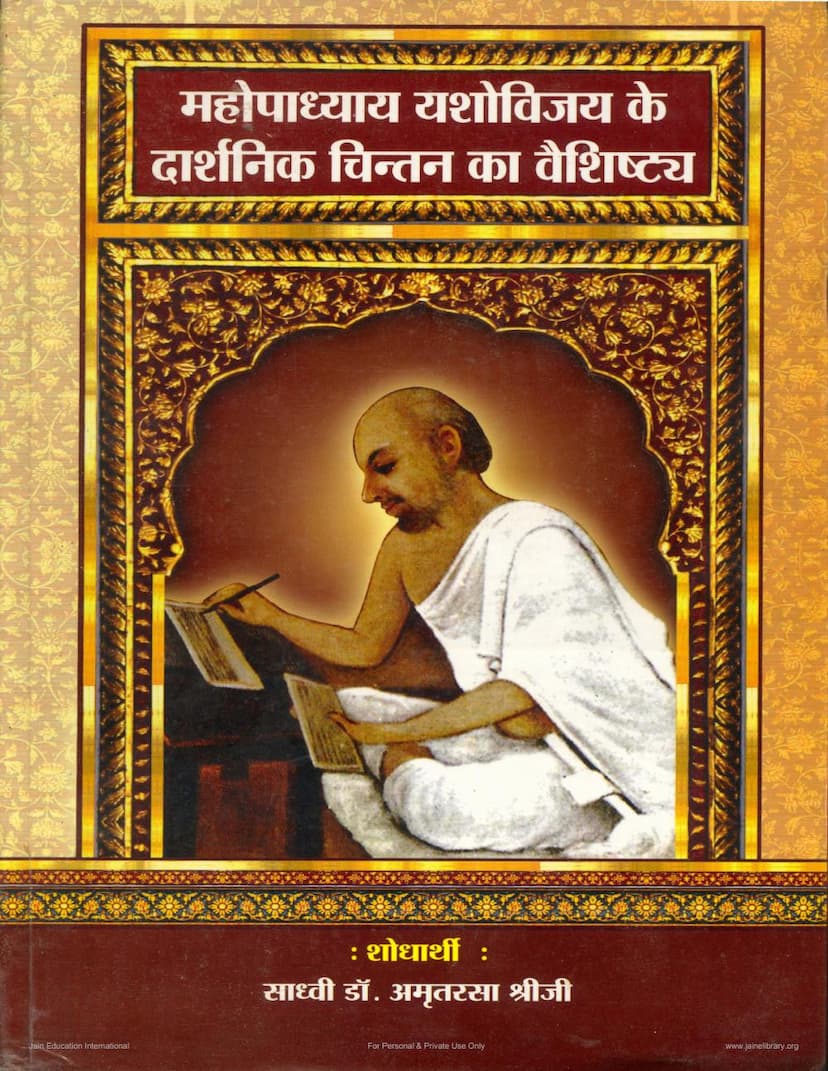Mahopadhyay Yashvijay Ke Darshanik Chintan Ka Vaishishtya
Added to library: September 2, 2025

Summary
This detailed summary is based on the provided Jain text.
Book Title: Mahopadhyay Yashvijay ke Darshanik Chintan ka Vaishishtya (The Distinctive Features of the Philosophical Contemplation of Mahopadhyay Yashovijay) Author: Sadhvi Dr. Amrutrasashreeji Publisher: Shri Raj-Rajendra Prakashan Trust, Ahmedabad Catalog Link: https://jainqq.org/explore/004261/1
This comprehensive doctoral dissertation, authored by Sadhvi Dr. Amrutrasashreeji and published by Shri Raj-Rajendra Prakashan Trust, Ahmedabad, delves into the distinctive philosophical contemplation of Mahopadhyay Yashovijayji Maharaj, a prominent Jain scholar and philosopher. The research was conducted under the guidance of Dr. Anand Prakash Tripathi and has been accepted by Jain Vishva Bharti Institute, Ladnun, for a Ph.D. degree.
Core Theme:
The book meticulously analyzes the philosophical thought of Mahopadhyay Yashovijayji, highlighting its unique contributions and significance within the Jain tradition and broader Indian philosophical discourse. It aims to present a deep and accessible understanding of his complex ideas.
Key Aspects Explored:
The dissertation is structured into nine chapters, each focusing on a specific facet of Yashovijayji's philosophical contributions:
-
Chapter 1: Personality and Work of Upadhyay Yashovijayji
- This chapter provides a biographical sketch of Yashovijayji, detailing his life from his upbringing, his initiation into the monastic order, his scholarly pursuits in Kashi, and his significant contributions to Jainism. It highlights his intellectual prowess, his mastery of various philosophical schools (Shad Darshan), his unique blend of logic and spirituality, and his profound knowledge of Jain Agamas. His epithets like "Nyayavisharad," "Tarkashironmani," and "Kalkal Shrutkevali" are discussed, underscoring his scholarly achievements. The chapter also touches upon his exemplary character traits such as guru devotion, humility, equanimity, and his literary output across Sanskrit, Prakrit, Gujarati, and Hindi languages.
-
Chapter 2: Upadhyay Yashovijayji's Spiritualism (Adhyatmavad)
- This chapter explores Yashovijayji's concept of spiritualism, defining it as the focus on the soul and its inherent purity. It discusses his views on the ultimate goal of life, the superiority of spiritual pursuits over material ones, and the path to self-realization. The role of asceticism, detachment, and equanimity in achieving spiritual liberation is also examined.
-
Chapter 3: Metaphysics (Tattvamimansa)
- Here, the research delves into Yashovijayji's understanding of reality, including his views on Sat (existence), Lokavad (cosmology), the nature of Dravya (substance), Guna (attributes), and Paryaya (modes). His interpretation of the Navatattva (nine realities) and the significance of Syadvada (the doctrine of conditional predication) in understanding the multifaceted nature of reality are critically analyzed.
-
Chapter 4: Epistemology and Logic (Jnanavada and Pramanamimansa)
- This chapter focuses on Yashovijayji's theories of knowledge (Jnana) and valid means of knowledge (Pramana). It examines his understanding of Matijnana (sense knowledge), Shrutajnana (scriptural knowledge), Avadhijnana (clairvoyance), Manahparyayanana (telepathy), and Kevalajnana (omniscience). The chapter also explores his contributions to Jain logic and his critical analysis of other philosophical systems' epistemologies.
-
Chapter 5: Anekantavada and Nayavada
- This significant chapter elaborates on the core Jain principles of Anekantavada (non-absolutism) and Nayavada (the doctrine of standpoints). It explains how Yashovijayji used these principles to present a comprehensive and nuanced understanding of reality, emphasizing the importance of multiple perspectives and the avoidance of dogmatic assertions. The research highlights his skillful application of these doctrines to reconcile seemingly contradictory viewpoints from various philosophical schools.
-
Chapter 6: Karma Mimamsa and Yoga
- This chapter analyzes Yashovijayji's profound understanding of the Karma theory, explaining its nature, processes, classifications, and its role in the cycle of birth and death. It also explores his teachings on Yoga, defining its essence as the union of the individual soul with the universal soul and outlining the various paths and practices for achieving it.
-
Chapter 7: Philosophy of Language (Bhasha Darshan)
- This chapter examines Yashovijayji's insights into the philosophy of language, exploring his views on the nature of language, its connection to thought, and its role in conveying philosophical and spiritual truths. His understanding of how language can both reveal and obscure reality is discussed.
-
Chapter 8: Mysticism (Rahasyavada)
- This chapter delves into the mystical dimensions of Yashovijayji's thought, exploring his insights into the nature of ultimate reality, the path to spiritual experience, and the role of devotion and inner realization.
-
Chapter 9: Concepts from Other Philosophies in Yashovijayji's Perspective
- This final chapter analyzes how Yashovijayji engaged with and synthesized concepts from other Indian philosophical traditions, such as Vedanta, Samkhya, Yoga, Nyaya, and Mimamsa. It highlights his ability to integrate diverse philosophical ideas within the broader framework of Jainism, demonstrating his inclusive and tolerant approach to philosophical inquiry.
Overall Significance:
The book emphasizes that Mahopadhyay Yashovijayji was a pivotal figure in the revival and dissemination of Jain philosophy. His ability to present complex spiritual and philosophical concepts in a clear, logical, and accessible manner, often using the refined analytical tools of Naya and Syadvada, made Jain thought comprehensible to a wider audience. His emphasis on the harmonious synthesis of knowledge and practice, logic and spirituality, and his profound understanding of various philosophical schools contributed significantly to the intellectual and spiritual landscape of his time and continues to inspire seekers of truth today. The dissertation itself is a testament to the enduring relevance and depth of his philosophical contributions.